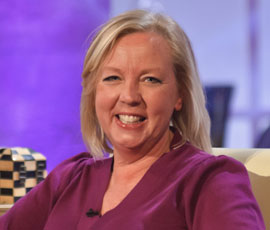Dragons’ Den star calls for dairy farm debate

Dragons’ Den businesswoman Deborah Meaden is backing calls for an industry-wide debate about large-scale dairying.
Ms Meaden has helped launched a report examining the economics of large and small dairy farms in good times and in bad.
“The British dairy is in crisis,” she said. “Ordinary farmers are being railroaded into thinking that bigger is better and they must go intensive to survive.”
Ms Meaden, who has invested more than £1.6m in businesses during her time on the TV show Dragons’ Den, said she wouldn’t invest in a large-scale dairy farm because it was too high risk and not a good long-term option.
The report, Weighing up the Economics of Dairy Farms, was launched by the World Society for the Protection of Animals on Friday (9 September).
Animal welfare campaigners from the group fought a planning application for an 8,100 dairy farm in Lincolnshire earlier this year.
Better returns can be made from average sized pasture-based farms than from large-scale dairy unit, their study argues.
High output operators selling large volumes of milk might make profits 25% higher than low output producers when prices are high, it says.
But when prices fall, low cost producers still break even while high output herds make a loss of 5p on every litre.
Therefore a £50,000 profit can turn into a £50,000 loss in a single year, the report suggests.
Dairy farmers are already in a volatile situation and their future needs to be built on consistency, not more vulnerability, it warns.
If times are good, a large-scale dairy farm could be more profitable, but in bad times it could easily go bust.
The report was co-written by Neil Darwent, a Somerset dairy farm manager who is also a Nuffield scholar.
“Evidence is emerging that the pasture-based systems we have today are both efficient and competitive,” he said.
“Farmers do not need to turn to mega-dairies to survive.”
Pasture-based dairy herds that produced the majority of the UK’s milk were not inherently inefficient, said Mr Darwent.
“Farmers are failing to generate satisfactory returns due to an imbalance of power in the supply chain.”
Suzi Morris, WSPA UK director, said the campaign group felt there should be a wider discussion on the future of the dairy sector.
“Our business model is radical in its simplicity,” she said.
“We want dairy farming to maintain its pasture-based system and measure profit on keeping robust cows that are healthier and live longer, as well as the quantity of milk they produced.”
But industry body DairyCo accused WSPA of using false assumptions and demonstrating an astonishing naivety about dairy farming in Britain.
Peter Thorne, manager of DairyCo’s benchmarking programme Milkbench Plus, said the industry welcomed debate on issues that concerned dairy farming.
But he added: “These discussions, at a key time for dairy farmers, must be based on facts.”
The suggestion that farmers were being “railroaded” into going intensive to survive couldn’t be further from the truth, said Dr Thorne.
“The results from our business benchmarking and analysis service show that increasing size is just one option.”
Smaller farms could also be extremely efficient and make money, added Dr Thorne.
“Business planning and the right management practices are the most influential factors when it comes to making money from milk.”
Some dairy farmers did indeed see increasing scale as the way forward.
But there were many dairy farmers with average sized herds who have no intention of increasing their herd size.
“It is likely that there will continue to be a wide range of dairy farm types and sizes in Britain in the future,” Dr Thorne said.
The WSPA study presented a hypothetical calculation to support claims that high output dairy farmers were more vulnerable to a downturn in milk prices .
“This conclusion is based on false assumptions regarding the relative production costs of the two systems,” said Dr Thorne.
What do you think of Deborah Meaden’s comments? Join the debate on our website forum
